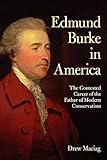Edmund Burke in America : The Contested Career of the Father of Modern Conservatism / Drew Maciag.
Material type: TextPublisher: Ithaca, NY : Cornell University Press, [2013]Copyright date: ©2017Description: 1 online resource (304 p.)Content type:
TextPublisher: Ithaca, NY : Cornell University Press, [2013]Copyright date: ©2017Description: 1 online resource (304 p.)Content type: - 9780801467875
- Conservatism -- History -- United States
- Conservatism -- United States -- History
- Political science -- Philosophy -- United States
- Political science -- United States -- Philosophy
- Political Science & Political History
- U.S. History
- POLITICAL SCIENCE / Political Ideologies / Conservatism & Liberalism
- political philosophy, history of conservatism, edmund burke reputation, progressive era politics, modern conservative movement, new conservatives, american political history
- 320.520973 23/eng/20230216
- online - DeGruyter
| Item type | Current library | Call number | URL | Status | Notes | Barcode | |
|---|---|---|---|---|---|---|---|
 eBook
eBook
|
Biblioteca "Angelicum" Pont. Univ. S.Tommaso d'Aquino Nuvola online | online - DeGruyter (Browse shelf(Opens below)) | Online access | Not for loan (Accesso limitato) | Accesso per gli utenti autorizzati / Access for authorized users | (dgr)9780801467875 |
Frontmatter -- Contents -- Preface -- Introduction: In Search of Icons -- 1. Burke in Brief: A “Philosophical” Primer -- Part I: Early America -- 2. Old Seeds, New Soil: The Land of Paine -- 3. Federalist Persuasions: John and J. Q. Adams -- 4. Democratic America: The Ethos of Liberalism -- 5. American Whigs: A Conservative Response -- Part II: Transition to Modern America -- 6. The Gilded Age: Eclectic Interpretations -- 7. Theodore Roosevelt: Blazing Forward, Looking Backward -- 8. Woodrow Wilson: Confronting American Maturity -- Part III: Postwar America -- 9. Modern Times: Conjunctions and Consensus -- 10. Natural Law: A Neo-traditionalist Revival -- 11. The Cold War: Existential Threat Redux -- 12. Contemporary Conservatives: Victories and Illusions -- Conclusion: A World without Fathers -- Notes -- Index
restricted access online access with authorization star
http://purl.org/coar/access_right/c_16ec
The statesman and political philosopher Edmund Burke (1729–1797) is a touchstone for modern conservatism in the United States, and his name and his writings have been invoked by figures ranging from the arch Federalist George Cabot to the twentieth-century political philosopher Leo Strauss. But Burke’s legacy has neither been consistently associated with conservative thought nor has the richness and subtlety of his political vision been fully appreciated by either his American admirers or detractors. In Edmund Burke in America, Drew Maciag traces Burke’s reception and reputation in the United States, from the contest of ideas between Burke and Thomas Paine in the Revolutionary period, to the Progressive Era (when Republicans and Democrats alike invoked Burke’s wisdom), to his apotheosis within the modern conservative movement.Throughout, Maciag is sensitive to the relationship between American opinions about Burke and the changing circumstances of American life. The dynamic tension between conservative and liberal attitudes in American society surfaced in debates over the French Revolution, Jacksonian democracy, Gilded Age values, Progressive reform, Cold War anticommunism, and post-1960s liberalism. The post–World War II rediscovery of Burke by New Conservatives and their adoption of him as the "father of conservatism" provided an intellectual foundation for the conservative ascendancy of the late twentieth century. Highlighting the Burkean influence on such influential writers as George Bancroft, E. L. Godkin, and Russell Kirk, Maciag also explores the underappreciated impact of Burke’s thought on four U.S. presidents: John Adams and John Quincy Adams, Theodore Roosevelt, and Woodrow Wilson. Through close and keen readings of political speeches, public lectures, and works of history and political theory and commentary, Maciag offers a sweeping account of the American political scene over two centuries.
Mode of access: Internet via World Wide Web.
In English.
Description based on online resource; title from PDF title page (publisher's Web site, viewed 26. Apr 2024)


